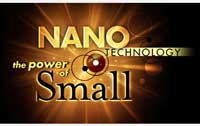Apr 2 2008
April 2008 witnesses the launch of two efforts--with major funding from the National Science Foundation--that are intended to promote understanding of nanotechnology among the general public. Nanotechnology is the art and science of manipulating matter at the nanoscale (down to 1/100,000 the width of a human hair) to create new and unique materials and products. It is also the subject of "Nanotechnology: The Power of Small," a three-part, in-depth Fred Friendly Seminars series, airing on public television beginning this month; and NanoDays, a nationwide offering of educational programs about nanoscale science and engineering and its potential impacts.
 "Nanotechnology: The Power of Small" airs on public television stations beginning in April 2008. Credit: The Convergence Project
"Nanotechnology: The Power of Small" airs on public television stations beginning in April 2008. Credit: The Convergence Project
"Nanotechnology: The Power of Small" brings together policymakers, scientists, journalists and community leaders to explore the promises and problems of this new technology. Guided by John Hockenberry, public radio news anchor and former NBC News correspondent, panelists wrestle with the benefits and risks of nanotechnology in three one-hour programs devoted to the issues of privacy, health and the environment. In "Watching You. Watching Me," panelists explore such questions as whether a tiny implantable sensor is a reasonable way to keep track of a grandparent who may be experiencing dementia. In "Forever Young," they discuss how nanomedicine could greatly expand life expectancy while creating a detailed record of individuals' health indicators. In "Clean, Green and Unseen," panelists look at the allure and the unknowns surrounding promising new consumer products and environmental applications
The series is a co-production of Fred Friendly Seminars, Inc., and ICAN Productions, and is part of a larger project to provide content resources to venues that engage the public in thoughtful deliberation about our technologic future.
"The Fred Friendly Seminars format is a great way to bring these issues alive," says series producer Cynthia Needham of ICAN Productions. "Panelists struggle with the kinds of issues people will confront in the near future, with nanotechnology affecting everything from medicine to alternative energies to the way we approach military engagement. Through the discussion we can see the changes we should expect, and understand the need to make some important decisions now."
More information on "Nanotechnology: The Power of Small," including video clips and local broadcast information, is available at http://www.powerofsmall.org/.
Concurrent with "Nanotechnology: The Power of Small," a consortium of science museums is enlightening the public about nanoscale science and engineering through educational programs at more than 100 science museums, research centers and universities across the country comprising the Nanoscale Informal Science Education Network (NISE Net). Led by Boston's Museum of Science with the Science Museum of Minnesota and San Francisco's Exploratorium, NISE Net is developing and distributing innovative approaches to engaging Americans in nanoscale science and engineering, research and technology.
On April 2 and 3, representatives from NISE Net sites around the country come to Washington, D.C., where they participate in NanoDays activities, held in conjunction with the STEM Education and Nanotechnology Congressional Caucuses. Participants use interactive nanotechnology exhibits to demonstrate the properties of nanoscale materials. Visitors to this event can build models of carbon nanotubes, experiment with gravity and magnetism, and hear directly from nanoscale researchers, among other activities.
Exhibitors include the Association of Science-Technology Centers; Harvard University; Howard University; Fred Friendly Seminars, New York, N.Y., and ICAN Productions, Hyde Park, Vt.; Lawrence Hall of Science, Berkeley, Calif.; Museum of Life and Science, Durham, N.C.; Museum of Science, Boston, Mass.; Oregon Public Broadcasting; The Exploratorium, San Francisco, Calif.; and University of Wisconsin, Madison, Wis.
On Wednesday, April 2, from 3:00-5:00 p.m., the exhibitors attend NanoDays on the Hill, in room 2105 at the Rayburn Building. On Thursday, April 3, from 11:00 a.m. - 1:00 p.m., the exhibitors come to the National Science Foundation's headquarters in Arlington, Va.
More information on NISE Net, including a listing of institutions involved in NanoDays, is available at www.nisenet.org/nanodays.